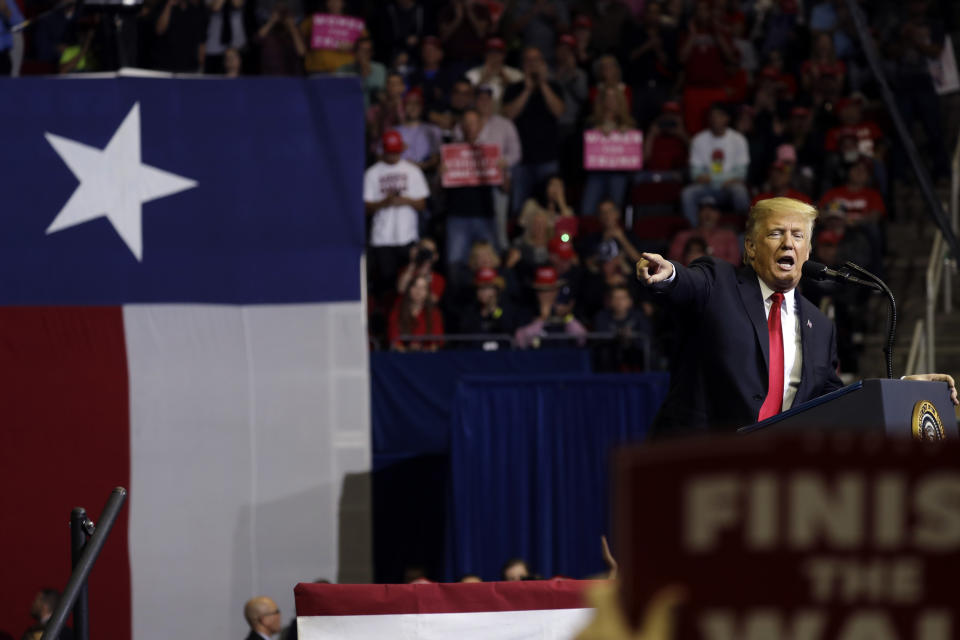Republicans Try To Fill In The Blanks On Fake Trump Tax Bill
WASHINGTON ― Seeming to conjure policy out of thin air, President Donald Trump said over the weekend there would be “a major tax cut for middle-income people” early in November. And while a new tax cut was news to Republicans, on Tuesday they decided to play along.
House Ways and Means Chairman Kevin Brady (R-Texas) said his tax-writing committee would “continue” working with the Trump administration on a new tax cut for middle-class families, “to be advanced as Republicans retain the House and Senate.”
The last phrase seemed particularly important, as Brady made the tax cut contingent on Republicans keeping the House and Senate ― a prospect that looks unlikely.
Hidden in Brady’s statement is at least one confession: Trump’s timeline was pure fiction. The president initially suggested Congress would pass this tax cut before the election. But lawmakers have left Washington to campaign in their districts. Congress isn’t due back until the second week of November, at which point they’ll have to deal with a looming government funding deadline. Congress will not be passing a tax cut before the election ― or any time soon after.

Until Brady’s face-saving statement, nobody in the administration or in Congress had been able to explain what the proposal would actually look like, mostly because no one was talking about it before Trump’s comments on Saturday.
Trump’s new promise recalls a similar one he made as Republicans started drafting the sweeping tax bill they passed last year ― a promise that didn’t pan out.
“The rich will not be gaining at all with this plan,” Trump said in September 2017. He later claimed the law would be bad for him personally.
But the rich did benefit from the tax overhaul Congress passed last December. While the new law increased after-tax income for households at all income levels, the independent Tax Policy Center found that higher-income households benefited the most. And not by accident.
The Tax Cuts and Jobs Act modestly lowered individual tax rates but dramatically cut the corporate tax rate from 35 to 21 percent, a windfall for corporations and their shareholders. And nobody but the wealthiest 0.2 percent of households benefit from the law’s changes to the estate tax, which applies only to multimillionaires.
Republicans said workers would eventually benefit from corporate tax changes that spur capital investment and increase productivity over a period of years. They also claimed a series of corporate bonus announcements in January showed the law was already working. Recent wage and bonus data suggest workers are still missing out.
With the new proposal, Trump seems to be admitting that the tax law hasn’t been as helpful to Republican candidates as some had hoped. For many workers, increases in take-home pay from the lower tax rates may have been eaten by higher health insurance premiums. The law has had mildly unfavorable polling numbers and a September analysis of campaign TV commercials showed that less than 12 percent of Republican ads even mentioned it.
Trump said on Monday that the new policy would cut middle-income taxes by about 10 percent, stressing that this bill would not also benefit corporations.
“We’re doing it now for middle-income people,” he said. “This is not for business; this is for middle.”
Even if Republicans wanted to pass a new tax bill after the election, it’s hard to see how they’d do it. Without Democratic help, Republicans would need to use the budget reconciliation process again for another tax cut ― the same process that let them skirt Senate rules and pass the tax bill with 50 votes and not the customary, filibuster-proof 60 votes.
But Republicans don’t have a budget to use as a vehicle for reconciliation, because they never agreed to one this year. And because Republicans are likely to lose control of the House ― even though they’d have a couple months of time until Democrats take over in January ― Brady has laid the groundwork for Republicans to just claim they can no longer do this 10 percent cut because Democrats will be taking control of the chamber. Again, this is a tax cut no one had seriously considered until Trump acted as if it were imminent Monday night.
Republicans have already shown that they have no real intention to make any new tax laws ― as their efforts with another recent bill showed. The corporate provisions of the Tax Cuts and Jobs Act were permanent, but the household ones expire in 2025. Last month, the House passed a bill to make the household cuts permanent, but they didn’t show much interest in getting the bill through the Senate, where Democrats can try to block it.
On Tuesday, a reporter asked Kevin Hassett, chairman of the White House Council of Economic Advisers, if he could share any details about mystery tax proposal.
“Right now, the person who’s discussing the 10-percent tax cut for the White House is the president, and so you should go to the press office and to the president if you want more information on that,” Hassett said.
That’s probably because no one in Washington seems to know what Trump is talking about.
Love HuffPost? Become a founding member of HuffPost Plus today.
This article originally appeared on HuffPost.


